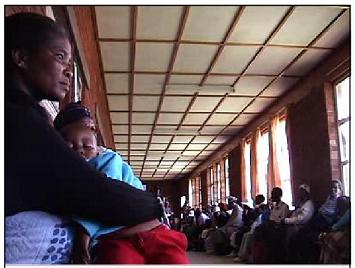Science and the human heart
There is no limit
There is no failure here sweetheart
Just when you quit
- From the song "Miracle Drug" by U2
Production capacity and an adequate number of healthcare workers and clinics are all-important considerations when it comes to fighting HIV/AIDS in developing nations. In a 2005 Boston Globe article by John Donnelly, we see how economic contributions from philanthropic and government efforts can only take the global fight against the disease so far. The battle to slow the rapidly-spreading HIV virus has come a long way, but there is still a lot of work to be done before a real difference can be made and before we can rest assured that our sincere efforts are not wasted.
Many places, even entire countries, are still not ready to start programs. In the small West African nation of Guinea-Bissau, a shipment last month of Brazilian-made antiretroviral drugs arrived at the airport—and there it sits, because the country does not have trained health workers to oversee distribution.

In a Lesotho village, a mother waits with many others in a clinic waiting room so her child may be seen by the one specialist who has come from far away to work in her village. Photo Credit: Joao Silva, NYT
Clinics are swamped, overcrowded, and backlogged. Stress is unimaginably high among healthcare workers. Because of overwhelming demand,manufacturers of some drugs drugs currently purchased by the US program PEPFAR have had trouble meeting orders because of a greatly increased demand for the drugs.
Several heads of US-funded AIDS programs said the projected drug shortages raise long-term concerns about whether pharmaceutical companies or generic manufacturers have the capacity to keep up with rising future demands. Still, the biggest long-term problem for AIDS treatment programs is the lack of trained healthNew York Times columnist Nicholas Kristof, who recently wrote about the need and hope for reform in African governments [subcription required], has an eye-opening series of video, photography, and narratives about the HIV/Aids crisis in Africa, done in conjunction with guest journalism student Casey Parks. While Mr. Kristof credits the Bush administration for some of what they've done about the AIDS crisis, there is a very serious problem in the hypocrisy of the unrealistic expectation that we can stop the spread of the HIV virus by sticking to politically conservative guns:
workers, specialists said.
[..] donors will have to find ways to increase the salaries of health workers in poor countries to prevent more from leaving their jobs. One important step was the British development agency's decision to give nearly $200 million to the government of Malawi with the express purpose of increasing health workers' pay.
A central problem is that the U.S. program is sometimes squeamish about condoms for young people and obsesses about abstinence. Christina Lem, a friend working on an AIDS orphan project, saw a U.S.-funded aid worker (my emphasis) in Zambia warning kids away from condoms because they break.What does it truly say about national and global moral leadership when people are dying unnecessary and painful deaths for a conservative values-judgement?
The Bush administration is right to promote abstinence, but condoms must be part of the message. Pontificating against promiscuity only goes so far, because often what kills African women isn't flings but marriage.
In Zimbabwe, burial space is running out. From today's NYT article by Michael Wines:
The six government cemeteries in Harare, Zimbabwe’s capital, are either full or nearing capacity and citizens are already casting about for places to bury their dead, the government-run newspaper The Herald reported. The shortage of burial space is tied to the AIDS epidemic, which kills roughly 3,000 Zimbabweans a week, and to the nation’s collapsed economy, which has curtailed adequate food supplies and medical care for the sick. City officials are recommending that the dead be cremated, but cremation runs counter to the culture of many Zimbabweans, and a dire shortage of coal has crimped cremation options in any case. Some mourners are shipping bodies to Mutare, on the Mozambique border, where wood-fired crematoriums are available, The Herald reported.We may have our own troubles here in the United States, but I assure you they pale in comparison to this. How much longer can any of us close our eyes and pretend we just don't see the suffering?
In the vacuum of political leadership in our nation's capital today, celebrities and our former President Bill Clinton have helped to generate public awareness and funding for the fight against the spread of HIV/AIDS. Michael Wines [NYT] writes:
..what makes the Clintons and Bonos such spectacular philanthropic successes is that they are clearly not only playing a part. [..] Mr. Clinton's gift for bringing passion to humanitarianism has raised hundreds of millions of dollars while decades of those stolid ''You-can-help-this-child-or-you-can-turn-the-page'' appeals have, increasingly, spurred readers to turn the page.




21.jpg)







0 comments:
Post a Comment